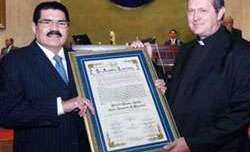On Nov. 5, Washington State residents went to the polls and voted against making their state the first place in the U.S. where it is legal for doctors to kill suffering people who want to die. Even apart from the outcome of that state’s much talked-about Initiative 119, it has become clear in the last year that Americans are at a moral crossroads in their approach to sickness and death.
Questions that have long troubled the souls of believers and others are now the stuff of social and political debate: What is life? What is death? Is there no more meaning to human existence than a life that ends in death? Or is it true, as the Catholic Church teaches, that all life is holy and death is not the end? Can there be any meaning in chronic pain and seemingly unjust suffering? What is the quality of mercy and how can love and compassion be declared in the face of such suffering?
The search for “good death”—which is what the word “euthanasia” originally meant—has become a part of the public mood and political agenda in both America and abroad. That desire was the driving force behind Initiative 119 as well as the European Parliament’s recent deliberations about whether to let Europe’s doctors help their patients commit suicide.
The Western world is the throes of a “prevalent ‘death mentality,’” Pope John Paul II told the world’s bishops in June. Likewise, the world’s cardinals, in an April communiqué, condemned the “dramatic aggressiveness in the daily attacks on human life, especially in its weakest and most vulnerable state.”
 The rising specter of euthanasia and the growing number of abortions worldwide can no longer be seen as “a problem of individual morality,” the cardinals said. Those questions of life and death, they believe, are now the crucial issues of “social morality and political ethics.”
The rising specter of euthanasia and the growing number of abortions worldwide can no longer be seen as “a problem of individual morality,” the cardinals said. Those questions of life and death, they believe, are now the crucial issues of “social morality and political ethics.”
Catholic leaders are saying that the euthanasia dispute is rooted in a profound popular despair and feelings that humans are powerless to control the medicines and medical machines that they have created.
Those worries, it seems, are felt most acutely in America and Europe. While much of the world’s population struggles against grinding poverty and disease that kills millions before their time, people in the industrialized West are anguished by the “mixed blessings” of their own wealth and prosperity, Cardinal Joseph Bernardin of Chicago said recently.
Cardinal Bernardin noted that a girl born today in America can expect to live for about 79 years; a boy, 71. In Haiti, the hemisphere’s poorest country, the life expectancy of men and women is roughly 20 years less. The dilemma for Americans is that, though they are living longer, they are now spending a greater part of their lives in sickness and ill-health.
Graying of America
With the “graying” of the population, more and more Americans are faced with caring the often heart-rending experience of caring for an elderly loved one who is chronically or terminally ill. Even those who have never experienced it worry that one day their own life might become only a death deferred. They fear living as “vegetables,” being kept alive by machines, without the power to think, act, or love.
Underlying what Archbishop J. Francis Stafford of Denver calls “a growing ‘euthanasia mentality,’” there is also a sort of cultural malaise that has gripped the world’s advanced industrialized societies. As the bishops of France noted in their recent statement on caring for the dying, peoples’ fears about death reveal what society believes about the meaning of life.
The euthanasia movement, they said, is a product of the West’s cultural values of materialism, consumerism, and individualism. Those values are at work in the West’s glorification of youth and health, as well as in the stubborn refusal to address the reality and dignity of sickness and death. That outlook, the bishops believe, has resulted in “a banalization of everyday life” in Western societies.
Human life is increasingly considered according to the material and economic dictates of making and acquiring products and wealth, as Bishop James Griffin of Columbus, Ohio, said in a 1989 letter on aging and dying. With its “overemphasis in income-producing work,” American culture signals that people are valued only “for what they do, rather than for who they are,” he said.
Persons who are unable to measure up to society’s ideas of human worth are increasingly at risk in these times of economic uncertainty and decline. Catholic leaders fear that legalized euthanasia would pave the way for the broader drive to ration health care and other rights to populations thought to be of lesser value, such as infants born with handicaps or diseases, the mentally and physically disabled, persons with AIDS, and the elderly.
Such fears are not far-fetched. Health care rationing is already being considered in Oregon, and Michigan recently began denying welfare assistance to contain classes of people. And even if they aren’t legally denied dignity and rights, the debate about euthanasia and rationing sends a distressing message to society’s most vulnerable people: namely, that they are an unwanted burden and that whether they live or die is a subject for “reasonable” people to debate in legislatures and courtrooms.
Pleasure Seekers
Ultimately, Cardinal Bernardin believes, the obsession with euthanasia issues from society’s materialistic and secular vision of human life, which sees bodily and sensual comfort and pleasure as life’s end desire and goal. Seen in that light, suffering and sickness can have no possible value and questions of God and moral law are deemed to be besides the point.
“An ethos of instant gratification does not suffer pain or sacrifice easily,” Cardinal Bernardin said in a 1988 address. “A world whose meaning is centered in a seemingly unlimited present moment may interpret death as a purely human event, devoid of any relationship to a divinity who sustains a truly endless eternity.”
The campaign for a “right to die,” like the drive for “the right to abortion,” is a sign of a great crisis of conscience in the Western world, according to John Paul. “People’s moral conscience appears frighteningly confused,” he lamented in his June letter to the world’s bishops.
Political discourse is not just a reflection of this moral confusion, the Pope said. Because the debate is conducted by persons with “poorly formed” consciences, it contributes to the further “blunting of the moral sensitivity of people’s consciences,” he warned.
In a statement to Oregon’s legislature Archbishop William Levada of Portland referred to Christ’s “Gospel of life,” and declared that “the meaning of human life is grounded in the fact that life is a gift that comes from God, who is its origin and its destiny.”
This theological belief has deep political consequences, Catholic leaders say. Because life is a gift from God, only God has the power and the right to take life; such decisions can never be left to private individuals or to the government.
To deny one’s own right to life or to deny that right to another person or group, according to the Pope, “is an offense against the human person and against God the Creator and Father, the loving source of all life.”
Suffering and Meaning
Throughout the euthanasia debate, Catholic leaders have stressed the need to recover a sense of the meaning and power of human suffering. “The story of Jesus tells us that suffering need not be useless, but can become redemptive through our response,” Florida’s bishops said in a 1989 letter on aid to the dying.
By suffering and dying on the cross, and by rising from the dead, Jesus became a “sharer in all human sufferings,” John Paul explained in his 1984 pastoral letter, Salvifici Doloris (“On the Christian Meaning of Human Suffering”). Suffering people suffer with Christ, and Christ himself suffers with each person burdened and afflicted by disease, illness, or injustice, the Pope said. And those who suffer and die with Christ will also rise with him, as St. Paul has promised.
The suffering person must, through faith and the grace of God, overcome his or her sense of uselessness and helplessness, and discover Christ present in their suffering, according to John Paul. The apostles and saints rejoiced to be counted worthy to suffer for God’s kingdom, and those who suffer today have also received a great “calling” from God, the Pope said.
The “vocation” of suffering is to accept that suffering as an invitation to follow Christ, to offer up one’s life for the salvation of the world.
“Suffering is present in the world in order to release love, in order to transform the whole of civilization into a ‘civilization of love,’” John Paul has written.
By denying any meaning to suffering and death, proponents of a “right to die” have put the very future of civilization in jeopardy. In their recent euthanasia statement, the American bishops harkened back to the Second Vatican Council’s warning against “euthanasia and willful suicide” which “poison civilization” and corrode the moral sensibilities of individual and societies.
The “right to dispose of the life of another person” cannot be granted “without destroying the whole basis of the juridical order,” France’s bishops have agreed.
Recalling the origins of totalitarianism ad fascism earlier in this century. Cardinal Joseph Ratzinger, the Vatican’s top theologian, has also warned against an assault on the right to life “in the name of a public usefulness which is really only the interest of a few.”
A false notion of human freedom, one which ignores the bonds that connect individuals to God and to community, is behind the euthanasia debate, the American bishops have concluded. The political freedom to die, they warn, may well spell the death of true human freedom.
“The Declaration of Independence proclaims our inalienable rights to ‘life, liberty and the pursuit of happiness,’ ” the bishops noted. “It our right to life itself is diminished in value, our other rights will have no meaning.”
First published in The Evangelist (November 7, 1991)
© David Scott, 2009. All rights reserved.


